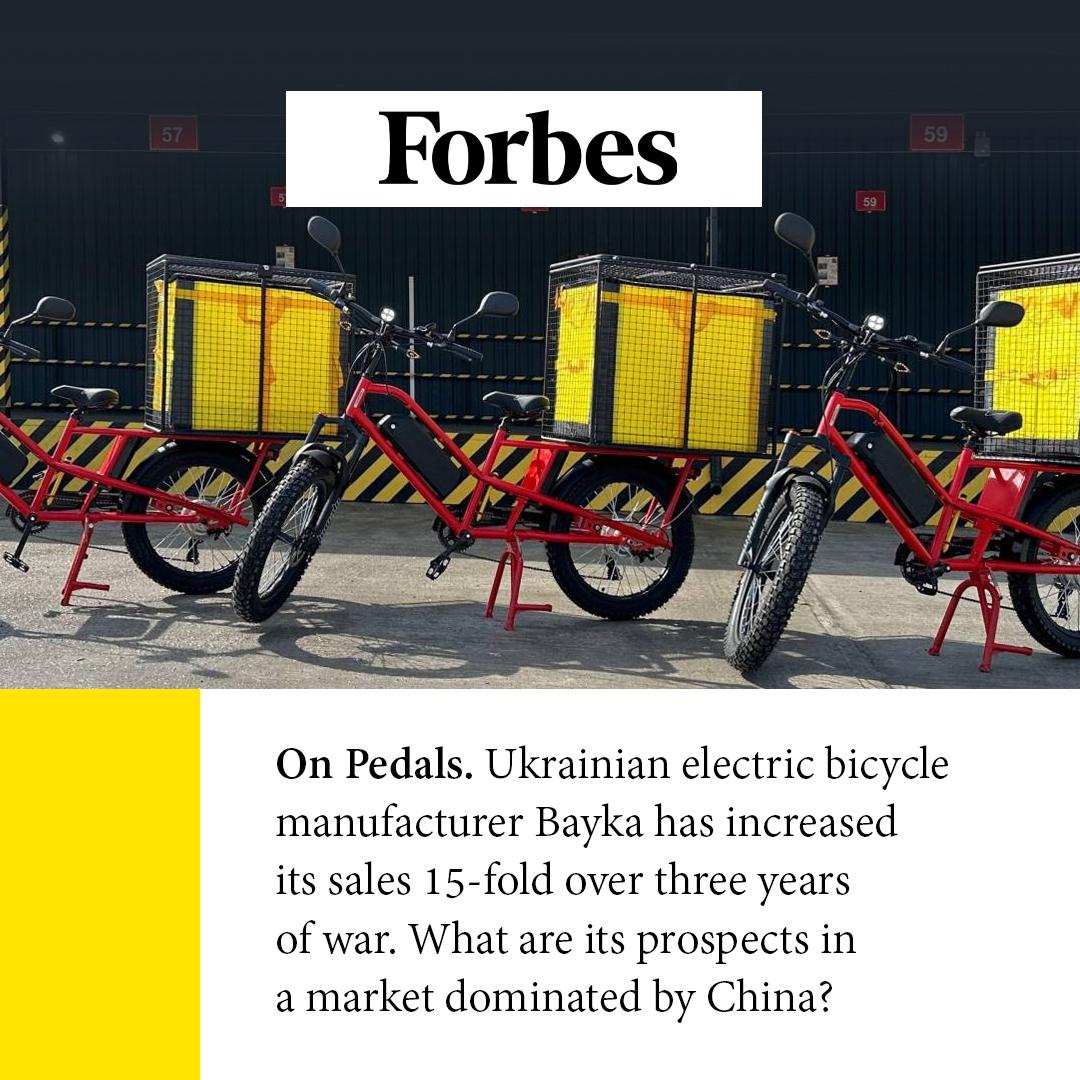Pedal Power: Can Ukraine’s Bayka Compete in a Market Dominated by China?

On February 24, 2022, Bayka was scheduled to sign its founding documents and formally launch the company, recalls Oleksandr Lytvyn, 33, the startup's co-founder. The team had secured an investor a year earlier at the Youth Business Forum in Chernihiv. “I liked both the guy and the project,” says Oleksandr Suvorov, 53, founder of PET Technologies, a Ukrainian manufacturer of PET mold equipment. In 2022, Suvorov invested UAH 20 million into Bayka. Total investment in the project has reached UAH 35 million.
The company was eventually founded on May 6, 2022 — after the de-occupation of the Chernihiv region, where Bayka's production is based. Bayka focuses on electric bikes for postal services, delivery companies, and other B2B clients. In the last three years, it has signed contracts with Ukrposhta, Nova Poshta, Silpo, and Ukrainian rental service Shuttle Moto.
From University Lab to Manufacturing Floor
“Bayka existed since 2015 purely on the enthusiasm of the team — it wasn’t a business,” says Lytvyn. At the time, he was an associate professor at Chernihiv Polytechnic, designing electric bikes with colleagues and students in the university’s workshop.
In 2019, Bayka met its first client at the Interpipe TechFest in Dnipro, where they were asked to design a bike for an in-house delivery service. That led to the BikeBox project and the first cargo e-bike prototypes.
That same year, the team participated in Ukraine’s YEP! Starter program. “We realized we needed to find an investor to take things further. That search took three years,” Lytvyn explains.
Suvorov invested both directly (funding) and indirectly (allowing the team to use his company's equipment and premises). When a missile hit the university’s production base in 2022, Bayka relocated to the PET Technologies facility. “The team needed to learn what a company and a production process really are,” adds Suvorov.
In early 2023, a second investor joined: Oleksandr Honcharuk, founder and CEO of leasing company A-Finance, who contributed UAH 15 million to help Bayka move to its own facility, purchase equipment, and expand the team.
Bayka now operates out of two production sites in Chernihiv: one on PET Technologies' premises and another 2,000-square-meter facility of its own. The company offers ten models of electric transport, battery packs, and charging stations. “Ninety-nine percent of our products are designed for courier services: two- and three-wheeled cargo bikes and scooters,” says Lytvyn. Bayka also operates as a custom atelier, offering tailored solutions for each client.
With 25 employees, the company has the capacity to produce 1,200 units per year. So how does a newcomer land major clients?
Selling the Bike
The global electric bicycle market is on the rise and projected to reach $37.01 billion by 2025, according to Statista. China dominates, producing 70% of the world’s bikes, including e-bikes, as reported by ST Daily in 2024.
The average e-bike price in 2025 is expected to be around $861.55. Competing with China is no small feat — even Delfast, another Ukrainian brand, exited the consumer e-bike market due to price pressure.
Cargo e-bikes account for about 20% of e-bike sales on Ukraine’s Rozetka marketplace. Yet, none of the top five best-selling models on Prom.ua are cargo bikes or Ukrainian-made.
“It’s too early to sell e-transport to individuals — it's too expensive,” says Suvorov. Businesses, however, are willing to pay €3,000–6,000 per bike. Unlike Delfast, which targeted personal use, Bayka is firmly B2B — 90% of sales, confirms Lytvyn.
Bayka doesn’t reveal exactly how it landed major clients like Nova Poshta and Silpo. But the strategy is clear: target big players willing to pay more for domestic products. “Their strategy makes sense,” says Vadym Ihnatov, founder of Ukrainian e-pickup brand LUAZ Motors and deputy head of the EV-UA Association.
Nova Poshta uses Bayka bikes for about 50% of its electric delivery needs, according to its press office. “We chose them because they’re a Ukrainian manufacturer. We didn’t even look at Chinese bikes. Price matters, but it’s not the only factor,” says their response. In 2025, Bayka bikes are used for delivering lightweight parcels within cities.
The average cargo e-bike on Rozetka sells for UAH 26,000. Bayka’s model costs UAH 46,000, while a comparable model from Ukrainian brand Eleek goes for UAH 98,200. Nova Poshta buys from both.
Can Ukrainian bikes ever be cheaper than Chinese ones? Unlikely, says Denysenko from Delfast. About 80% of components are imported from China. Still, Bayka has localized 60% of its production — developing frames, software, seats, batteries, and chargers in-house. The rest comes from the Czech Republic, Germany, Poland, China, Taiwan, and the U.S.
Ukrainian manufacturers offer flexibility, says Denysenko: “They can quickly tailor a product to the client's needs.” Bayka provides free test units, custom specs, and adapted service models. The full sales cycle, from first contact to contract, can take 6–18 months.
What’s Next?
Global trends favor electric transport, says Ihnatov. Delivery giants like DHL, DPD, and USPS already use e-bikes in major cities, where combustion vehicles are increasingly restricted. By 2035, new gas-powered cars and vans will be banned in the EU under the Fit for 55 climate package.
“We see ourselves as the #1 electric delivery vehicle maker in Ukraine and among the global top 5 in 5–10 years,” says Lytvyn.
Bayka’s revenue in 2024 was only UAH 5.4 million, according to YouControl. “Some orders rolled over into 2025, which affected reported revenue,” explains Lytvyn. But things are picking up: by the end of 2024, Bayka signed UAH 25 million in contracts for 2025. “We aim to grow that portfolio by another 40–50%,” says Lytvyn.
Bayka also plans international expansion, starting with Poland. They registered a subsidiary there in 2024 but have not begun exports yet. “Certification is on hold while we test and adapt our models for the new market,” explains Lytvyn.
